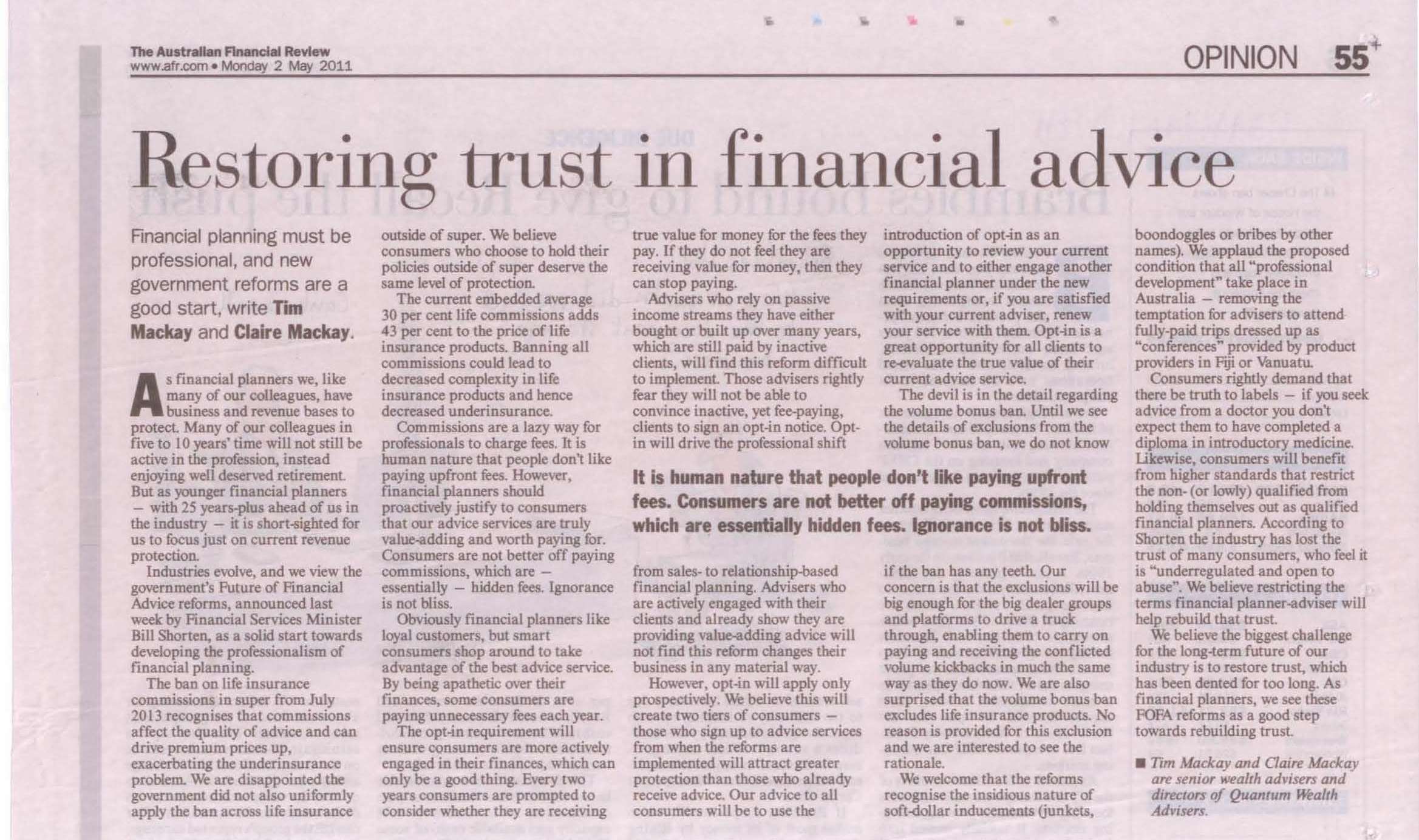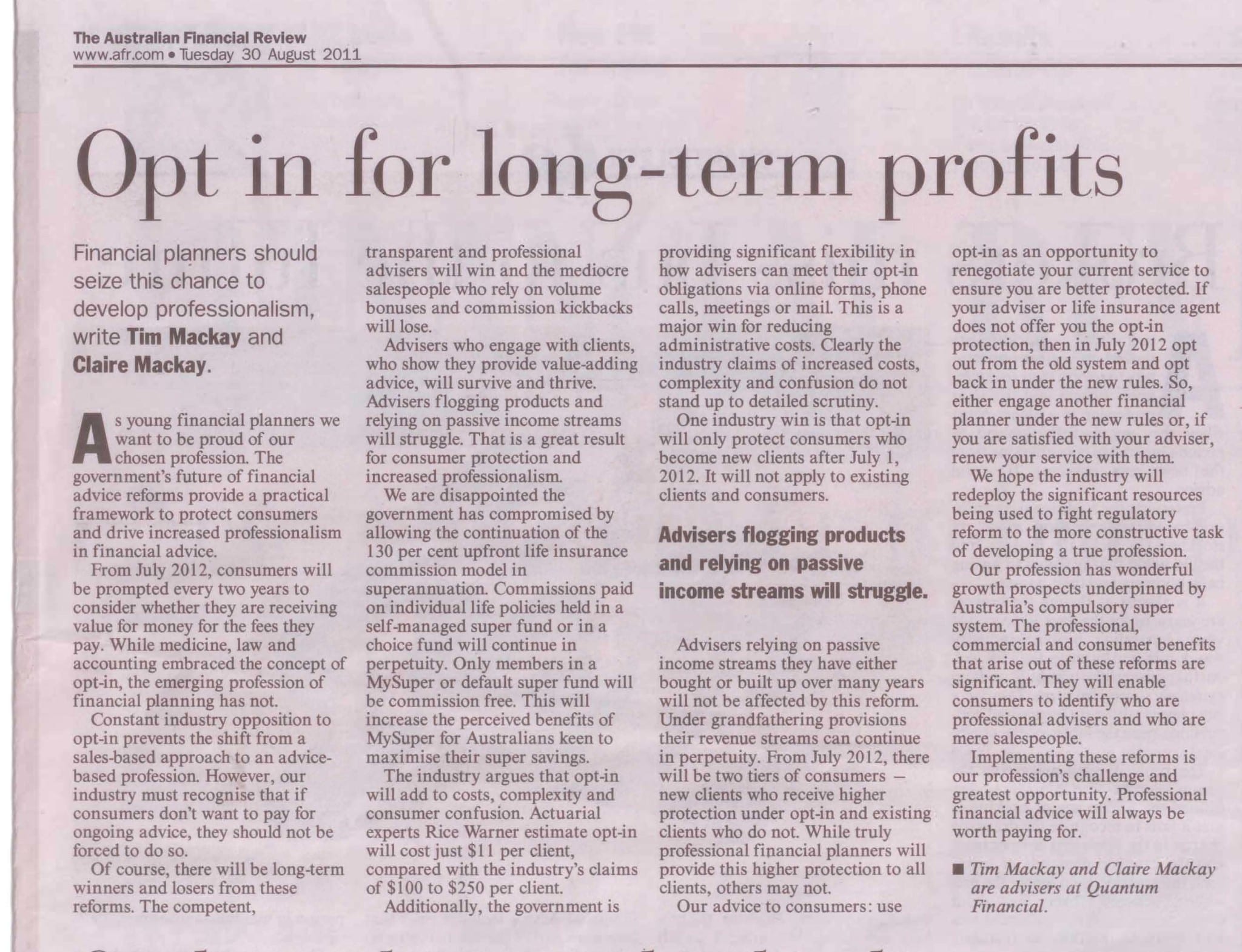At Quantum Financial we have long supported professional reforms in financial planning. Here are two articles we wrote in the Australian Financial Review loudly calling for change.
In light of recent revelations from the Royal Commission into Misconduct in the Banking, Superannuation and Financial Services Industry, we re-visit two op-ed articles we wrote seeking to truly reform financial planning for the better. Our goal was to both better protect consumers and to increase professionalism in the industry.


Text of the above articles
Restoring trust in financial advice
Source: Australian Financial Review 2 May 2011
Financial planning must be professional, and new government reforms are a good start, write Tim Mackay and Claire Mackay.
As financial planners we, like many of our colleagues, have business and revenue bases to protect. Many of our colleagues in 5 to 10 years’ time will not still be active in the profession, instead enjoying well deserved retirement.
But as younger financial planners – with 25 years-plus ahead of us in the industry – it is short sighted for us to focus just on current revenue protection.
Industries evolve, and we view the government’s Future of Financial Advice reforms, announced last week by Financial Services Minister Bill Shorten, as a solid start towards developing the professionalism of financial planning.
The ban on life insurance commissions in super from July 2013 recognises that commissions affect the quality of advice and can drive premium prices up, exacerbating the underinsurance problem. We are disappointed the government did not also uniformly apply the ban across life insurance outside of super. We believe consumers who choose to hold their policies outside of super deserve the same level of protection.
The current embedded average 30 per cent life commissions adds 43 per cent to the price of life insurance products. Banning all commissions could lead to decreased complexity in life insurance products and hence decreased underinsurance.
Commissions are a lazy way for professionals to charge fees. It is human nature that people don’t like paying upfront fees. However, financial planners should proactively justify to consumers that our advice services are truly value-adding and worth paying for.
Consumers are not better off paying commissions, which are – essentially – hidden fees. Ignorance is not bliss.
Obviously financial planners like loyal customers, but smart consumers shop around to take advantage of the best advice service.
By being apathetic over their finances, some consumers are paying unnecessary fees each year. The opt-in requirement will ensure consumers are more actively engaged in their finances, which can only be a good thing. Every two years consumers are prompted to consider whether they are receiving true value for money for the fees they pay. If they do not feel they are receiving value for money, then they can stop paying.
Advisers who rely on passive income streams they have either bought or built up over many years, which are still paid by inactive clients, will find this reform difficult to implement. Those advisers rightly fear they will not he able to convince inactive, yet fee-paying, clients to sign an opt-in notice. Opt-in will drive the professional shift from sales- to relationship-based financial planning. Advisers who are actively engaged with their clients and already show they are providing value-adding advice will not find this reform changes their business in any material way.
However, opt-in will apply only prospectively. We believe this will create two tiers of consumers – those who sign up to advice services from when the reforms are implemented will attract greater protection than those who already receive advice. Our advice to all consumers will be to use the introduction of opt-in as an opportunity to review your current service and to either engage another financial planner under the new requirements or, if you are satisfied with your current adviser, renew your service with them. Opt-in is a great opportunity for all clients to re-evaluate the true value of their current advice service.
The devil is in the detail regarding the volume bonus ban. Until we see the details of exclusions from the volume bonus ban, we do not know if the ban has any teeth. Our concern is that the exclusions will be big enough for the big dealer groups and platforms to drive a truck through, enabling them to carry on paying and receiving the conflicted volume kickbacks in much the same way as they do now. We are also surprised that the volume bonus ban excludes life insurance products. No reason is provided for this exclusion and we are interested to see the rationale.
We welcome that the reforms recognise the insidious nature of soft dollar inducements (junkets, boondoggles or bribes by other names). We applaud the proposed condition that all “professional development” take place in Australia – removing the temptation for advisers to attend fully-paid trips dressed up as “conferences” provided by product providers in Fiji or Vanuatu
Consumers rightly demand that there be truth to labels – if you seek advice from a doctor you don’t expect them to have completed a diploma in introductory medicine. Likewise, consumers will benefit from higher standards that restrict the non- (or lowly) qualified from holding themselves out as qualified financial planners. According to Shorten the industry has lost the trust of many consumers, who feel it is “underregulated and open to abuse”. We believe restricting the terms financial planner -adviser will help rebuild that trust.
We believe the biggest challenge for the long-term future of our industry is to restore trust, which has been dented for too long. As financial planners, we see these FOFA reforms as a good step towards rebuilding trust.
Tim Mackay and Claire Mackay are senior wealth advisors and directors at Quantum Financial.
Opt in for long term profits
Source: Australian Financial Review 30 August 2011
Financial planners should seize this chance to develop professionalism write Tim Mackay and Claire Mackay.
As young financial planners we want to be proud of our chosen profession. The Government’s FOFA reforms provide a practical framework to protect consumers and drive increased professionalism in financial advice.
The reforms include a best interest obligation, a two year opt-in requirement, strengthening ASIC’s powers and clarification of some of the more detailed aspects of the FOFA reforms.
From July 2012 consumers will be prompted every two years to consider whether they are receiving true value for money for the fees they pay. While medicine, law and accounting have long embraced the concept of opt-in, the emerging profession of financial planning has not.
Constant industry opposition to opt-in prevents the shift from a sales based approach to an advice based profession. However, our industry must recognise that if consumers don’t want to pay for ongoing advice, they should not be forced to do so.
Of course, there will be long term winners and losers from these reforms. The competent, transparent and professional advisors will win and the mediocre salespeople who rely on volume bonuses and commission kick-backs will lose.
Advisers who are actively engaged with their clients who already show they provide value-adding advice will not only survive but thrive. Advisers flogging products and relying on passive income streams will struggle. That is a great result for consumer protection and increased professionalism.
We are disappointed the Government has compromised by allowing the continuation of the 130% up front life insurance commission model in superannuation. Commissions paid on individual life policies held in an SMSF or in a choice fund will continue in perpetuity. Only members in a MySuper or default super fund will be commission free. This will increase the perceived benefits of MySuper for Australians keen to maximise their super savings.
The industry argues that opt-in will add to costs, complexity and consumer confusion. Actuarial experts Rice Warner estimate opt-in will cost just $11 per client, a far more reasonable figure than industry’s widely ranging claims of $100 to $250 per client.
Additionally, the government is providing significant flexibility in how advisors can meet their opt-in obligations via online forms, phone calls, meetings or mail. This is a major win for reducing administrative costs. Clearly the industry claims of increased costs, complexity and confusion do not stand up to detailed scrutiny.
One industry win is that opt-in will only protect consumers who become new clients after 1 July 2012. It will not apply to existing clients and consumers who take up financial advice services before then.
Advisors relying on passive income streams they have either bought or built up over many years will not be impacted by this reform. Under grandfathering provisions their revenues stream can continue in perpetuity. From July 2012 there will be two tiers of consumers – new clients who receive higher protection under opt-in and existing clients who do not. While truly professional financial planners will provide this higher protection to all clients, others may not.
Our advice to consumers: Use opt-in as an opportunity to renegotiate your current advice service to ensure you are better protected. If your current advisor or life insurance agent does not offer you the opt-in protection, then in July 2012 opt-out from the old system and opt back in under the new rules. So, either engage another financial planner under the new rules or, if you are satisfied with your current advisor, renew your service with them under the new rules.
We hope the industry will redeploy the significant resources being used to fight regulatory reform to the more constructive task of developing a true profession.
Our profession has wonderful growth prospects underpinned by Australia’s compulsory super system. The professional, commercial and consumer benefits that arise out of these reforms are significant. They will enable consumers to identify who are professional advisors and who are mere salespeople.
Implementing these reforms is our profession’s challenge and greatest opportunity. Professional financial advice will always be worth paying for and we look forward to the coming years with great excitement for a profession that one day we can one day be proud of.
Tim Mackay and Claire Mackay are senior wealth advisors and directors at Quantum Financial.




